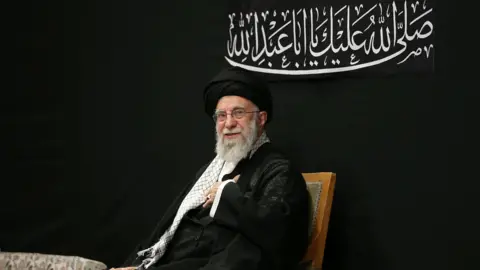Iran supreme leader in first public appearance since Israel war
 EPA
EPAIran's Supreme Leader Ayatollah Ali Khamenei has made his first public appearance since the start of Iran's conflict with Israel, according to state media.
State television footage showed him greeting worshippers at a mosque on Saturday during a ceremony a day before the Shia festival of Ashura.
Khamenei's last appearance was in a recorded address during the conflict with Israel, which began on 13 June and during which top Iranian commanders and nuclear scientists were killed.
Israel launched a surprise attack on nuclear and military sites in Iran, after which Iran retaliated with aerial attacks targeting Israel.
During the 12-day war with Israel, Khamenei appeared on TV in three video messages and there was speculation that he was hiding in a bunker.
On Saturday Iranian media coverage was dominated by Khamenei's appearance, with footage of supporters expressing joy at seeing him on television.
Khamenei is seen turning to senior cleric Mahmoud Karimi, encouraging him to "sing the anthem, O Iran". The patriotic song became particularly popular during the recent conflict with Israel.
State TV said the clip was filmed at Tehran's Imam Khomeini Mosque, named after the founder of the Islamic republic.
Iranian TV has invited people to send in videos sharing their reactions to Khamenei's return to the public eye.
His appearance comes as the predominantly Shia Muslim country observes a period of mourning during the month of Muharram, traditionally attended by the supreme leader.
Ashura is held on the 10th day of Muharram - this year falling on 6 July - during which Shia Muslims commemorate the death of Prophet Muhammad's grandson, Hossein.
On 26 June, in pre-recorded remarks aired on state television, Khamenei said Iran would not surrender to Israel despite US President Donald Trump's calls.
The US joined the war with strikes on Iranian nuclear facilities on 22 June.
The operation involved 125 US military aircraft and targeted three nuclear facilities: Fordo, Natanz and Isfahan.
Iran's judiciary said more than 900 people were killed during the 12-day war.
